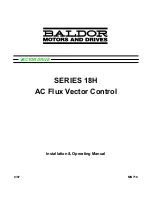
E
r
r
o
r
!
B
o
o
k
m
a
r
k
n
o
t
5-35
TRACe:DELete<segment_number>
Description
This command will delete a segment. The memory space that is being freed will be available for new
waveforms as long as the new waveform will be equal or smaller in size to the deleted segment. If the
deleted segment is the last segment, then the size of another waveform written to the same segment is not
limited. For example, let consider two segments, the first being a 1000-point waveform and the second with
100 points. If you delete segment 1, you can reprogram another waveform to segment 1 with size to 1000
points. If you reprogram segment 1 with 1004 points, the instrument will generate an error and will not
accept this waveform. On the other hand, if you delete segment 2, which was the last segment you
programmed, then you can reprogram this segment with waveforms having length limited only by the size of
the entire memory space.
Parameters
Name
Range
Type
Default
Description
<segment_
number>
1 to 10k
Numeric
(integer only)
1
Selects the segment number of which will be deleted
TRACe:DELete:ALL
Description
This command will delete all segments and will clear the entire waveform memory. This command is
particularly important in case you want to de-fragment the entire waveform memory and start building your
waveform segments from scratch.
TIP
The TRAC:DEL:ALL command does not re-write the memory so, whatever
waveforms were downloaded to the memory are still there for recovery. The
TRAC:DEL:ALL command removes all stop bits and clears the segment
table. You can recover memory segments by using the TRAC:DEF
command. You can also use this technique to resize, or combine waveform
segments.
TRACe:SELect<segment_number>
Description
This command will select the active waveform segment for the output. By selecting the active segment you
are performing two function:
1. Successive :TRAC commands will affect the selected segment
2. The SYNC output will be assigned to the selected segment. This behavior is especially important for
sequence operation, where multiple segments form a large sequence. In this case, you can
synchronize external devices exactly to the segment of interest
Summary of Contents for 5064
Page 26: ...1 5 Figure 1 2 ArbConnection The Control Panels Figure 1 3 ArbConnection The Wave Composer...
Page 71: ...2074 User Manual 2 18 This page intentionally left blank...
Page 145: ...2074 User Manual 3 74 Figure 3 48 Reading the 2074 Internal Temperature...
Page 220: ...4 ArbConnection Logging SCPI Commands 4 75 Figure 4 58 Log File Example...
Page 221: ...2074 User Manual 4 76 This page was intentionally left blank...
Page 333: ...2074 User Manual 7 2...
Page 359: ...2074 User Manual 7 28 This page was intentionally left blank...
Page 360: ...Appendices Appendix Title Page A Specifications A 1 1...
Page 361: ...2074 User Manual 2...
















































